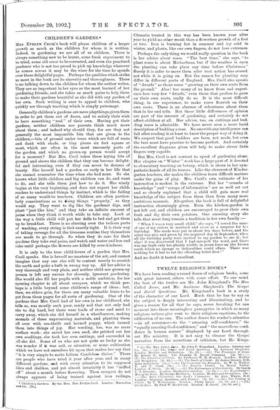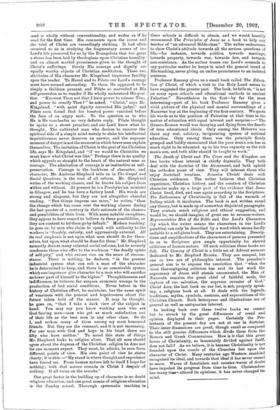TWELVE RELIGIOUS BOOKS.*
WE have been reading a round dozen of religious books, some with great interest, others with some effort. To our mind, the best of the twelve are Mr. John Kingsland's The Man Called Jesus, and Mr. Ambrose Shepherd's The Gospei and Social Questions. Mr. Kingsland's book is a study of the character of our Lord. Much that he has to say on the subject is deeply interesting and illuminating, and be gives a reason' for all that he says, never breaking for one moment into those meaningless panegyrics in which so many religious writers give vent to their religious emotions, to the edification of no one. The author draws his reader's attention —in all reverence—to the " amazing self-confidence," the "equally amazing God-confidence," and " the marvellous confi- dence in human nature " displayed by our Lord through. out His ministry. It is not easy to cleanse the Gospel narrative from the accretions of criticism, but Mr. Kings.
• (1.) The Man Called Jesus. By John P. Kingsland. London: Isbister and Co. [6s.] —(2.) The Gospel and Social Questions. By Ambrose Shepherd. London : Hodder and Stoughton. [2s. 641.1—(3.) The Principles of Jesus. By Robert E. Speer. The Fleming H. -Revell Company. [2s. 6d.1- (4.) The Education of Christ. By Professor W. M. Ramsay. London : Hodder and Stoughton. [2s. 6d.]—(5.) The Death of Christ. By James Denney, D.D. Same publishers. [6s.]—(6.) The Cross and the Kingdom. By W. L. Walker. T. and T. Clark. [90.] — (7.) Scientia Christi. By Henry Varley. London E. Stock. [2s. 6d.] —(3.) The Enthusiasm of Christianity. By Canon C. T. °rendez'. London : Skeffington and Son. [3s. 6d.]—(9.) Representativ, Men of the Bible. By George Matheson. London : Hodder and Stoughton. [6s.] —(10.) Bible Characters: Our Lord's Characters. By Alex. Whyte. D.D. London : Oliphant, Anderson, and Ferrier. [3s. 6d. ] —(1l) The Coming of Christ. By T. Warschauer. London : Philip Green. [1s. 6d. net.]—(12.) Christ Lore. By Fred W. Hackwood. London : E. Stock. itis. 6d. net.]
land is wholly without conventionality, and writes as if he read for the first time. His comments upon the arrest and the trial of Christ are exceedingly striking. It had often occurred to us in studying the fragmentary scenes of our Lord's life preserved for us by the Evangelists that too great a stress has been laid by theologians upon Christian humility, and an almost morbid prominence given to the thought of Christ's sufferings. Surely His courage and dignity are squally worthy objects of Christian meditation. These two attributes of His character Mr. Kingsland impresses forcibly upon the reader. To Herod and to Pilate our Lord's courage must have seemed astounding. To them He appeared to be simply a Galilean peasant, and Pilate so marvelled at His self-possession as to wonder if He wholly understood His posi- tion. "Knowest Thou not that I have power to release Thee, and power to crucify Thee P " he asked. " Christ," says Mr.
Kingsland, "with quiet dignity corrected His judge," and Pilate soon found that his boasted power vanished before
the face of an angry mob. To the question as to who He is He vouchsafes no very definite reply. Pilate thought he spoke to a street preacher, and our Lord knew what he thought. The cultivated man who desires to uncover the spiritual side of a simple mind merely to slake his intellectual inquisitiveness never deserves an answer, and the supreme moment of danger is not the moment in which brave men explain themselves. The imitation of Christ is the goal of the Christian life, says Mr. Kingsland, and " if we would be Christlike we must know what Christ was like." Perhaps there is no quality which appeals so straight to the heart of the natural man as courage. The admiration of courage is as instinctive as self- preservation. Courage is the backbone of character, and character, Mr. Ambrose Shepherd tells us in The Gospel and Social Questions, is the root of all reform. Mr. Shepherd writes of the working classes, and be knows his subject from within and without. At present be is a Presbyterian minister in Glasgow, and he has been a factory band. His words are strong and eloquent, but they are not altogether cheerful reading. " Few things impress me more," he writes, "than the change which has come over the working classes during the last quarter of a century in their estimate of the chances and possibilities of their lives. With some notable exceptions, they appear to have ceased to believe in these possibilities, or they are content to let them go by default." Modern teaching, be goes on, by men who claim to speak with authority to the workers is "frankly, entirely, and aggressively external. All its real emphasis is not upon what men should do for them- selves, but upon what should be done for them." Mr. Shepherd earnestly desires many external social reforms, but he severely condemns those who offer to the workman " the deadly opiate of self-pity," and whO excuse vice on the score of circum- stance. There is nothing, be declares, " in the present industrial system that can rob a man of the character he is determined to keep, and there is no conceivable system which can impute or give character to a man who will sacrifice no lower part of himself to the higher." Thoughtlessness and indifference, he believes, far surpass economic wrongs in the production of bad social conditions. Never before in the history of Christian effort, he maintains, has the same spirit of weariness with the present and hopelessness about the future taken bold of the masses. It may be thought, he goes on, " that I take a dark view of the subject in hand. You may say you know working men who are God-fearing men—men who get as much satisfaction out of their life as the best men in any other class. So do I, and reckon many of them among my most honoured friends. But they are the remnant, and it is not increasing. For one man with God and hope in his heart there are fifty who have neither." To mend this state of things Mr. Shepherd looks to religion alone. That all men should agree about the dogmas of the Christian religion he does not for one moment expect. They must, he admits, be seen from different points of view. His own point of view he states clearly; it is this:—"My stand is where thought and experience have forced me. From human nature left to itself I hope for nothing ; with that nature remade in Christ I despair of nothing. It all turns on the remake."
One great factor in the building up of character is no doubt religious education, and one great means of religious education is the Sunday schooL Thorough systematic teaching in
these schools is difficult to obtain, and we would heartily recommend The Principles of Jesus as a book to help any
teacher of " an advanced Bible-class." The writer endeavours to show Christ's attitude towards all the serious questions of life,—for instance, towards politics, towards marriage, towards property, towards war, towards law, and towards non-resistance. As the author traces our Lord's counsels in any particular matter he keeps in mind the general trend of His teaching, never giving an undue prominence to an isolated sentence.
Professor Ramsay gives us a small book called The Educa- tion of Christ, of which a visit to the Holy Land seems to have suggested the greater part. The book, he tells us, " is not an essay upon schools and educational methods in ancient Palestine." Nevertheless in the first—by far the most interesting—part of his book Professor Ramsay gives a vivid picture of the physical and mental surroundings of a Nazarene boy at the beginning of the first century. We quote his words as to the position of Palestine at that time in the matter of education with equal interest and surprise :—" The Graeco-Roman world was decaying and dying from the dearth of true educational ideals. Only among the Hebrews was there any real, salutary, invigorating system of national education. Only among them was the principle firmly grasped and boldly enunciated that the poor man's son has as much right to be educated up to his true capacity as the rich man's son, and both alike should be taught to work."
The Death of Christ and The Cross and the Kingdom are two books whose interest is chiefly dogmatic. They both deal with the doctrine of the Atonement, and both uphold the orthodox point of view. They will interest those who enjoy doctrinal treatises. Scientia Christi deals with Christian evidences. The writer believes that Christian experience, Christian history, and the creation of Christian character make up a large part of the evidence that Jesus Christ lived, died, and rose again according to the Scriptures. The Enthusiasm of Christianity is full of the warmth of feeling which it inculcates. The book is not written round any theory, but is made up of somewhat disjointed paragraphs. They contain much religious and ethical suggestion, and would be, we should imagine, of great use to sermon-writers. Representative Men of the Bible and Our Lord's Characters (by which the writer means the characters in our Lord's parables) can only be described by a word which seems hardly suitable to a religious book. They are entertaining. Descrip- tions and amplifications of the characters of persons presented to us in Scripture give ample opportunity for shrewd criticism of human nature. Of such criticism these books are full. The Coming of Christ is a little set of Advent sermons dedicated to Mr. Stopford Brooke. They are unequal, but oue or two are of philosophic interest. The preacher's general aim is to express the conviction that " when the most thoroughgoing criticism has said its last word the supremacy of Jesus still stands uncontested, the Man of Nazareth remains the great chief of faithful souls, the captain of our salvation, the supreme revealer of God." Christ Lore, the last book on our list, is not, properly speak- ing, a religious book at all. It deals with the legends, traditions, myths, symbols, customs, and superstitions of the Christian Church. Both letterpress and illustrations are of general as well as antiquarian interest.
In looking back over these twelve books we cannot but be struck by the great differences of creed and opinion displayed in their pages. Certainly the Pro- testants of the present day are not at one in doctrine- Their inner dissensions are great, though small as compared to the still greater differences which divide them from the Roman and Greek Communions. How is it that this great house of Christianity, so lamentably divided against itself, does not fall P As we believe, it is because Christianity is not founded upon the creeds of the Churches but upon the character of Christ. Many centuries ago Western mankind recognised its ideal, and towards that ideal it has never ceased to move. Waves of fanaticism and counter-waves of doubt have impeded its progress from time to time. Christendom has many tim✓• altered its opinions, it has never changed its mind.











































 Previous page
Previous page